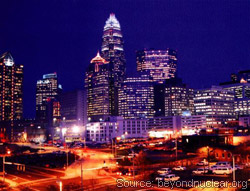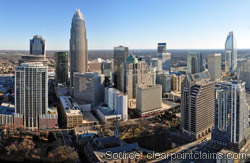 The second largest metropolitan area in North Carolina, Charlotte is one of the ten fastest growing cities in America. Evolving from a cotton-processing and railroad hub to the second largest financial center in the country, Charlotte boasts affordable homes, pleasant weather, good schools and a diverse culture. If you want to join thousands of others that are flocking to this exciting city, this informative guide will help you to relocate smoothly.
The second largest metropolitan area in North Carolina, Charlotte is one of the ten fastest growing cities in America. Evolving from a cotton-processing and railroad hub to the second largest financial center in the country, Charlotte boasts affordable homes, pleasant weather, good schools and a diverse culture. If you want to join thousands of others that are flocking to this exciting city, this informative guide will help you to relocate smoothly.
Charlotte Climate
Charlotte has a humid sub tropical climate, with four distinct seasons. Winters are short and cool; summers are hot and humid. The city is in the path of subtropical moisture from the Gulf of Mexico, and experiences plentiful precipitation. Rainfall reaches about 41.6 inches a year, with the summer being the wettest season. Snow is scarce, with only 4.4 inches a year--winter precipitation more commonly falls in the form of ice and sleet.
Charlotte Neighborhoods
Charlotte is home to 199 diverse neighborhoods, surrounding "center city" or Uptown Charlotte. Center city is Charlotte's business district, home to the headquarters of the Fortune 500 companies Bank of America and Duke Energy, as well as the center of East Coast Operations for Wells Fargo. Uptown Charlotte is also the center for the city's recreation, with numerous restaurants, museums, shops, and night spots. Uptown is the place to be if you are looking for opportunity or excitement in Charlotte.
If you are looking for something a bit funkier, Plaza-Midwood is Charlotte's most eclectic and diverse neighborhood. Located just northeast of Uptown, the neighborhood features a tree-lined strip known as The Plaza--full of art galleries, off-beat shops and boutiques, antique and consignment stores, live music venues and ethnic restaurants. The residential section of the neighborhood, known as Midwood, features early 20th century bungalow-style homes, restored to their historic allure.
Registering Your Car
Upon arrival in Charlotte, you will have to obtain a North Carolina driver's license before you can register your vehicle. You have 60 days to update your license upon establishing permanent residence. North Carolina requires new residents to take a written driving knowledge test, a sign recognition test and a vision test to update their license. Be sure to bring the following documents to the DMV: proof of residency, proof of age, proof of liability insurance, and proof of Social Security Number.
Once you have your license, you can register your car. North Carolina requires you to register the vehicle within 30 days of establishing residency.
Charlotte Schools
 Charlotte's public school system is operated by Charlotte-Mecklenburg Schools--the second largest district in the state and the 20th largest in the nation. It serves approximately 132,000 students in 159 facilities. The district has received widespread recognition as one of country's best, winning various education awards such as the 2011 Broad Prize for Urban Education.
Charlotte's public school system is operated by Charlotte-Mecklenburg Schools--the second largest district in the state and the 20th largest in the nation. It serves approximately 132,000 students in 159 facilities. The district has received widespread recognition as one of country's best, winning various education awards such as the 2011 Broad Prize for Urban Education.
Charlotte is home to many wonderful universities, including the University of North Carolina at Charlotte, the regions' largest college. It has three campuses--the Charlotte Research Institute campus, the Center City campus, and the Main campus in University City. Other notable schools include the private Queens University and the historically black college Johnson C. Smith University.
Charlotte Employment
Charlotte added 45,000 jobs in 2011, making it an appealing city to relocate during a time of a struggling economy. One of the fastest growing cities in America, Charlotte is home to 325 Fortune 500 companies and is leading economic development in the Southeast. The city is the second largest banking center after New York, making it a perfect place for aspiring finance professionals. The exciting city is home to Bank of America and the regional headquarters for East Coast Operations for Wells Fargo.
Charlotte is also making a name for itself in the energy sector and is being called the New Energy Capital, with over 240 energy companies including AREVA, Babcock and Wilcox, Duke Energy, Siemens Energy, and the Electric Power Research Institute.
Charlotte Moving Resources
There are numerous moving and storage companies located in Charlotte that are waiting to help you relocate to your new home. Be sure to do your research and obtain estimates from several different services before choosing one for hire. You can compare online quotes from many different moving companies and other services to aid you in your move to Charlotte, whether you are coming from the next city or overseas.
Living Costs in the City
 The cost of living in Charlotte is low compared to other major cities--nine percent lower than the national average. Cheap utilities and some of the most affordable housing of any city in the country make Charlotte an economical choice for relocation. Reasonable rent and real estate is available for prices 23 percent below the national average, with rent for the typical one-bedroom apartment in Charlotte running $777 and the average home listed at $140,000. Some of the most affordable neighborhoods to rent in Charlotte are Plaza-Midwood, Tryon Hills and Wessex Square.
The cost of living in Charlotte is low compared to other major cities--nine percent lower than the national average. Cheap utilities and some of the most affordable housing of any city in the country make Charlotte an economical choice for relocation. Reasonable rent and real estate is available for prices 23 percent below the national average, with rent for the typical one-bedroom apartment in Charlotte running $777 and the average home listed at $140,000. Some of the most affordable neighborhoods to rent in Charlotte are Plaza-Midwood, Tryon Hills and Wessex Square.
Charlotte Transportation
The Charlotte Area Transit System controls public transportation in the city and Mecklenburg County, operating the region's light rail transit, historic trolleys, buses and shuttles. It is the largest transportation system between Atlanta and Washington, DC with over 70 local, express, and regional bus routes transporting more than 22 million passengers each year.
The LYNX Blue Line is the Charlotte region's first light rail service. At 9.6 miles long, it runs from I-485 at South Boulevard to Uptown Charlotte, with 15 stations including seven park and ride locations. Trains are available every ten minutes during weekday rush hour, every 15 minutes during non-peak hours, and every 20 minutes on weekends from 5:26 a.m. to 1:26 a.m., making it a convenient and effective way to get around the city.
Charlotte Culture and Contemporary Life
Charlotte is chock-full of attractions, including fascinating museums, excellent shopping and live theatre and music. Stroll among fluttering butterflies at the Charlotte Nature Museum, shop 'til you drop at the region's largest mall in SouthPark, or sample unlimited local craft beers at the Queen City Brewers Festival in the historic NoDa district. Charlotte is also a hub for sports, hosting various collegiate sporting events and located just south of Charlotte Motor Speedway--home of NASCAR.
 Dining options in the city are diverse, ranging from Southern staples to innovative fusion cuisine. Enjoy comfort foods such as pecan wood-smoked BBQ at the family-owned McKoy Smokehouse and Saloon, and hearty soul food like Mac and cheese, shrimp and cornbread at Mert's Heart and Soul in Uptown Charlotte. If you desire something a bit more exotic on your plate, Charlotte is home to one of the most unique fusion restaurants ever imagined--The Cowfish Sushi Burger Bar. This inventive eatery's menu combines fresh sushi with beefy burgers, with appetizers as varied as coconut battered onion rings, fried pickles, and Ahi tuna tacos. It even features unthinkable items listed as "burgushi"--sushi combined with burger ingredients, burgers combined with sushi ingredients and combos that feature both contrasting cuisines together.
Dining options in the city are diverse, ranging from Southern staples to innovative fusion cuisine. Enjoy comfort foods such as pecan wood-smoked BBQ at the family-owned McKoy Smokehouse and Saloon, and hearty soul food like Mac and cheese, shrimp and cornbread at Mert's Heart and Soul in Uptown Charlotte. If you desire something a bit more exotic on your plate, Charlotte is home to one of the most unique fusion restaurants ever imagined--The Cowfish Sushi Burger Bar. This inventive eatery's menu combines fresh sushi with beefy burgers, with appetizers as varied as coconut battered onion rings, fried pickles, and Ahi tuna tacos. It even features unthinkable items listed as "burgushi"--sushi combined with burger ingredients, burgers combined with sushi ingredients and combos that feature both contrasting cuisines together.
Charlotte Relocation Tips
-
Live close to work. Traffic in Charlotte can become pretty backed-up, so make sure you will have a manageable commute.
-
Research the neighborhoods. Charlotte is a diverse city with nearly 200 unique neighborhoods. Are you searching for something historic or trendy? Do you prefer quieter residential areas like Myers Park, or the center of excitement like Uptown Charlotte, where everything you need is in walking distance? Do thorough research on the city's varied areas before choosing one to call home.
-
Make a checklist. Moving to a new city is difficult, and there are many things you'll need to get done besides packing your belongings and hauling them to your new home. The amount of tasks can seem overwhelming, especially if you're moving from another state. Before actually executing your move, make a checklist of all the things you have to do first--change your address, downsize your belongings, connect your utilities and check for moving quotes on Movers.com.